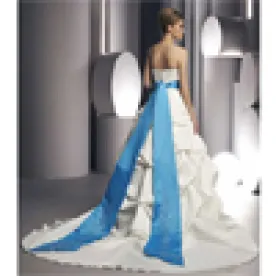Allegations that a highly specialized designer line of wedding dresses lacks reasonable substitutes fail to support allegations of Sherman Act violations for price fixing and group boycott claims. House of Brides etc., v. Alfred Angelo, Inc., Case No. 1:11-cv-07834 (N.D. Ill., December 4, 2014).
Alfred Angelo, Inc. (“Angelo”) is a designer, manufacturer and retailer of wedding products. House of Brides was an authorized Angelo retail dealer for over 40 years. While strictly a designer and manufacturer for many years, Angelo eventually entered into the operation of its own retail stores. Thus, it was engaged in “dual distribution,” in competition with its dealers such as House of Brides.
In 2004, Angelo announced a mandatory minimum retail pricing policy, which solicited agreement from authorized retailers not to discount its products below a set of minimum prices. It terminated retailers who did not comply. House of Brides first became aware of this policy in 2007, but refused to comply. It was notified by Angelo that failure to comply would result in its termination. House of Brides nevertheless rejected compliance. Angelo received complaints from other retail dealers of House of Brides refusal to abide by the minimum resale price policy.
In 2010, Angelo implemented a new set of marketing policies. It set forth a manufacturer’s suggested retail price (“MSRP”), and a minimum pricing policy (“MPP”). The MSRP represented the expected retail price for internet online sales. The MPP represented the minimum price for products sold in brick and mortar stores. House of Brides refused to confirm its agreement with the policies, and was terminated.
House of Brides subsequently brought an action in the United States District Court, Northern District of Illinois, for violations of the Sherman Act, and state antitrust and unfair competition laws.
House of Brides alleged that as to its price fixing claim, it was left with retail store samples that it had been required to purchase, but on which it could no longer take orders. It also alleged that Angelo’s minimum pricing policies and agreements with other retailers resulted in artificially high prices for consumers, and eliminated dealer competition for Angelo products. It also alleged that Angelo’s refusal to deal further was the result of its compliance with demands from competing retailers of Angelo products that it refuse to deal with House of Brides because of its refusal to abide by Angelo’s minimum pricing policies.
The District Court granted Angelo’s motion to dismiss, for failure to allege a relevant product market.
In a Second Amended Complaint (“SAC”), House of Brides alleged that Angelo brand wedding products constituted a cognizable relevant product market, and that Angelo products were sufficiently unique and highly differentiated such that other brands were unsuitable substitutes, and were not reasonably interchangeable.
The court granted Angelo’s motion to dismiss the SAC on the ground that it failed to “plausibly” plead that the Angelo brand wedding products constituted a cognizable market product. In addition, it denied a request for discovery to flesh out the allegations relating to the product market.
In attempting to materially supplement its allegations, House of Brides argued that pursuant to the Supreme Court decision in Bell Atlantic v. Twombly, 440 US. 544 (2007) and Ashcroft v. Iqbal, 566 U.S. 662 (2009) it was only required to allege that the relevant product market was “plausible,” and not that it was “probable.” While the court agreed, it nevertheless granted the motion to dismiss the SAC allegations. The court held that House of Brides failed to allege sufficient factual matter to “raise a right to relief above the speculative level,” and “nudge their claims across the line from conceivable to plausible.” Twombly, 550 U.S. at 555, 570.
While the court arguably could have dismissed the Sherman Act price fixing claim for the failure to allege a “contract, combination or conspiracy,” it instead granted the motion to dismiss for the failure of House of Brides to allege a plausible relevant market. The court considered implausible the allegations that the wedding products market was “unique” and “highly differentiated” as to render other brands unsuitable substitutes. Specifically, it held:
No matter how distinctive the work of a wedding dress designer may be, House of Brides’ unsupported contention that there are no adequate substitutes for Alfred Angelo bridal gowns is implausible to say the least. The argument implies that prospective brides who prefer Alfred Angelo designs would opt to pull an existing dress out of their closets rather than buy a own from another designer; not surprisingly, House of Brides offers no factual allegations to support that suggestion.
* * *
Given the importance of the occasion, even a bride with her heart set on an Alfred Angelo gown seems quite unlikely to prefer no wedding gown to one from another designer; in technical (if unromantic) terms, then, the cross-elasticity of demand for wedding gowns would seem to be high (and the case for defining the relevant product market by a single brand correspondingly low.)
The court also dismissed House of Brides’ argument that it needed discovery to allege facts sufficient to make its claim more plausible. House of Brides had been a dealer of Angelos for forty years, and accordingly, any further discovery would have been unnecessary. As the court stated:
This is not a case in which information necessary to state a claim lies within the exclusive providence of an adverse party.
Thus, rather than being “plausible,” the court found the allegations of lack of substitutability to be intuitively erroneous. Here, perhaps homo- and hetero-geneity are but discussion points on a continuum of cross-elasticity, and a function of the vantage point of the observer. “Uniqueness” does not mean that a prospective bride will go dressless, or “substitute” a pair of jeans.
As to the boycott claim, the court simply noted that allegations of dealer complaints, or “dealer noise” are insufficient” without more, to constitute a contract, combination or conspiracy to ripen into a plausible horizontal conspiracy allegation (citing Monsanto Co. v. Spray-Rite Service Corp., 465 U.S. 752, 763 (1984)).[1] Thus, we have another example of a situation where a litany of conclusory allegations will not trump the pre-conceived intuitive notions of what makes common sense to a court.
[1] The Second Amended Complaint also contained allegations of violation of the Robinson-Pearlman Act, the Illinois Antitrust Statutes, and tortious contract interference claims.



 />i
/>i

